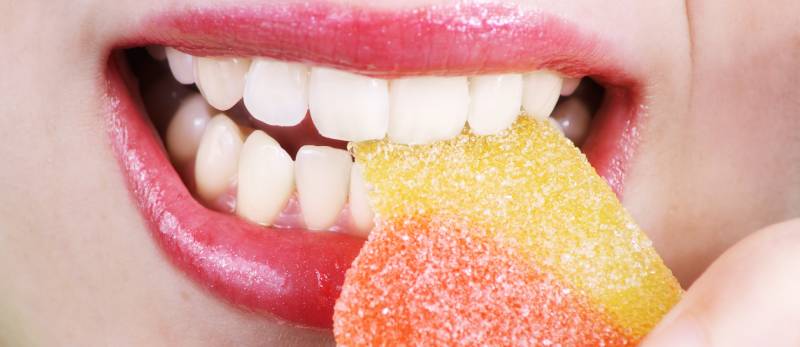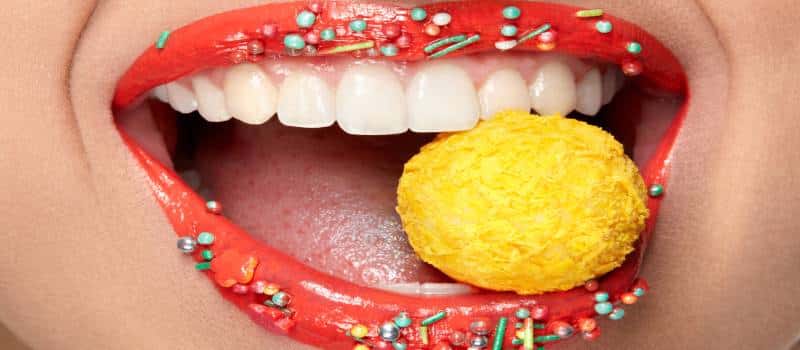If you have a sweet tooth, you’ll have an insatiable desire for sugar. You will particularly enjoy eating honey, ice cream, or chocolate cookies. Someone with a sweet tooth will prefer to have a cinnamon roll with hot chocolate for breakfast, rather than a sandwich or a cream cheese bagel.
To “have a sweet tooth” means to have a weakness or strong preference for all things sugary and sweet. We can use it in speaking or writing to express that someone is very keen on desserts and everything sweet to the taste.
If you felt identified with the previous statements, you’re probably in the group of people with a sweet tooth. To know more about this phrase, its meaning, and origin, keep reading below.
What Does This Phrase Mean?
You might smile at the thought of a cupcake topped with fluffy vanilla icing. Or when feeling the need to eat something sugary… like chocolate cake, peppermint creams, or sweetened snacks.
To ‘have a sweet tooth’ is a phrase that we have been using when referring to this kind of person. We usually say someone has a sweet tooth when having a craving or a strong fondness for sweet foods.
This term was first used in the 1300s. People started using the word sweet to describe tasty or delicious food. Today we make use of the word toothsome as an adjective to describe tasty or delicious food.
There are two separate words in “sweet tooth” without a hyphen. Sweet tooths is the plural form of “sweet tooth” in the Oxford English Dictionary.
A ‘sweet tooth” is just an expression, used in the same way as “ahead for heights” or “an ear for music.” In this case, we use it to denote a particular talent, as well as a predisposition towards it. Recently, this meaning has been dominating and has become a depiction of gluttony.
It is widely assumed that most overweight people have a sweet tooth. And the over-consumption of sugary delights got them there in the first place. But body weight doesn’t affect either the perception or the liking for sweets! So we can’t just blame it on our sweet tooth.

Where Did ‘Sweet Tooth’ Originate?
It is pretty common for people to have a sweet tooth and sometimes it’s considered a personal weakness. People with a sweet tooth enjoy eating sweet items like chocolates and ice cream. The sweeter the taste, the more joy it brings them.
Some studies find that the expression was first attested in 1591. But other sources claim it was around the 13th-16th century. It originated from the desire many people had for sweets as well as describing tasty or delicious foods.
This was called having a “sweet tooth”—earlier, the expression meant to refer to sweetmeat, wine, or pastry. But today, the expression refers to having a craze or love for cakes, pastries, and all sugary food items.
We have been using this idiom for hundreds of years for people who like all kinds of sweet-tasting food. In many languages, the word “sweet” connotes a pleasant experience.
There were many cultures where the concept of concentrated sweetness was unknown. But eating sugar adds a universal enthusiasm for a pleasant experience when eating.
According to an interview that was made with biologist Jason Cryan. The idea of obtaining high energy comes from eating sweet-tasting snacks. It would have made our earliest ancestors more adaptable to their environments.
Earlier, people had to spend time and effort figuring out how to obtain strength and energy. Having to eat more energy-dense food. But when we consider our ability to taste, our ability to perceive “sweet” is relatively weak. While our ability to perceive “bitter” is generally considered much stronger.
This leads to evolving a low tolerance of ‘bitter’ and high tolerance to ‘sweet.’ Because of all the basic taste qualities, sweetness is the most universally liked, giving us important information about the nature and quality of food.
The strong appetite for sugar and sweet drinks is so strong that it has influenced our course as humans. There is an inevitable desire for ingesting sweet food and drinks. And this recent sharp rise in the consumption of sugar is currently unknown.
We can’t deny the liking and enjoyment of sweetness and sweeteners around the world. Describing people who “prefer” sweets as having a sweet tooth. This implies that these individuals are different from those who “do not prefer” sweets.
The sweet tooth term has played an important role in human evolution. Studies of sweet perception have increased to help us to understand individual differences. And genetic studies are expanding our knowledge to unravel the mysteries behind our sweet tooth so that we may find more effective ways to shape and change it for our well-being.

When Can I Say ‘I Have A Sweet Tooth.’
Many people use this phrase to express their desire to eat sweet foods. Especially candy or chocolate, so when someone says, ‘I have a sweet tooth! It doesn’t mean they have a tooth made from sugar.
Idioms exist in every language. In English, these are phrases that have a different meaning to the individual word. For example, if you say someone has “cold feet,” it doesn’t mean their toes are actually cold. Rather, it means they’re nervous about something.
So the next time you want to talk about how much you love desserts and/or donuts, you say that you “have a sweet tooth.”

Related Terms For The Sweet Tooth
You can also refer to the sweet tooth when craving sugar in words like fondness liking or craving sweetened. Some people also use bittersweet, sugariness, or sugar cravings. Currently, there are no categorical antonyms for this word.
Examples
Here are some examples of how to properly use ”have a sweet tooth” in a sentence:
- She has a sweet tooth; she can’t resist chocolate cake and peppermint creams.
- There are many tasty recipes to please your sweet tooth.
- I spend a lot of money every week on candy and snacks to satisfy the sweet tooth my young children have.
- This ice cream is naturally sweet and full of antioxidants. So it’s bound to leave your sweet tooth satisfied, and your skin glowing from within!
- I’ve got a sweet tooth, so I’d find it difficult to give up sugar in my tea.
More Fun Idioms
Now I Know What It Means, But… Is It A Bad Thing?
When a sugar craving stops by uninvited, it’s hard to ignore your sweet tooth and mosey on with your day. And as much as you want to be the person who eats carrots instead of cinnamon for breakfast, the taste of something sweet lights up your day. But the health effects from these cravings are sometimes anything but positive.
Sugar may seem harmless. But it can have far-reaching health implications for people who constantly eat it. It has a lot of calories; therefore, this can be readily detected and used for energy. But a lot of health issues can be especially problematic for people who eat diets that are high in sugar.
A high-sugar diet can manifest quickly as blood glucose levels soar and then dive. Some other issues may fester over time, resulting in serious illnesses such as diabetes. But if we focus on a diet with whole foods that are naturally low in sugar, we can enjoy many health benefits.
Many sugar cravings stem from a blood sugar imbalance; when your body ingests sugar, your blood sugar spikes. Making your body release insulin to lower it to a safer level. When this happens, your blood sugar level is too low. Which makes your body crave food that will raise it and increase your energy.
A very popular trap you may be guilty of is meal-skipping or waiting too long between meals. This leads to significant hunger, which makes you crave anything sweet. Or a craving for food that will eventually convert to sugar in your body.
For one thing, all sweet food tastes good. Many food companies create research to determine which food components will tempt consumers’ taste buds the most.
Over time, our tolerance for sweet foods builds up, and we need more to reward ourselves. But understanding the reasons why you constantly crave sweets can help you reduce them and work toward a more balanced diet.
So next time, you don’t want to consume a lot of sugar, but you have a very strong desire for something sweet. You can replace it with snacks like almonds, cashews, pumpkin seeds, raw cacao nibs, or unsweetened raisins.
Shawn Manaher is the founder and CEO of The Content Authority. He’s one part content manager, one part writing ninja organizer, and two parts leader of top content creators. You don’t even want to know what he calls pancakes.

